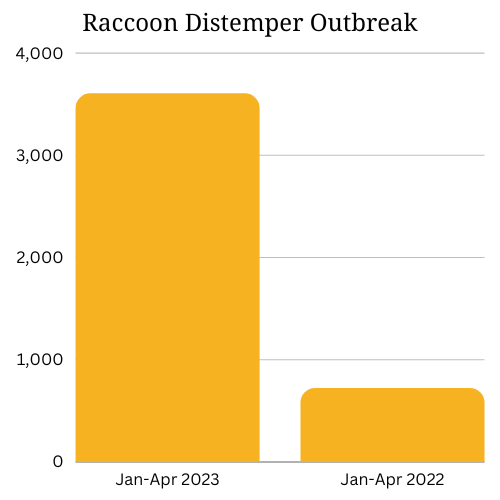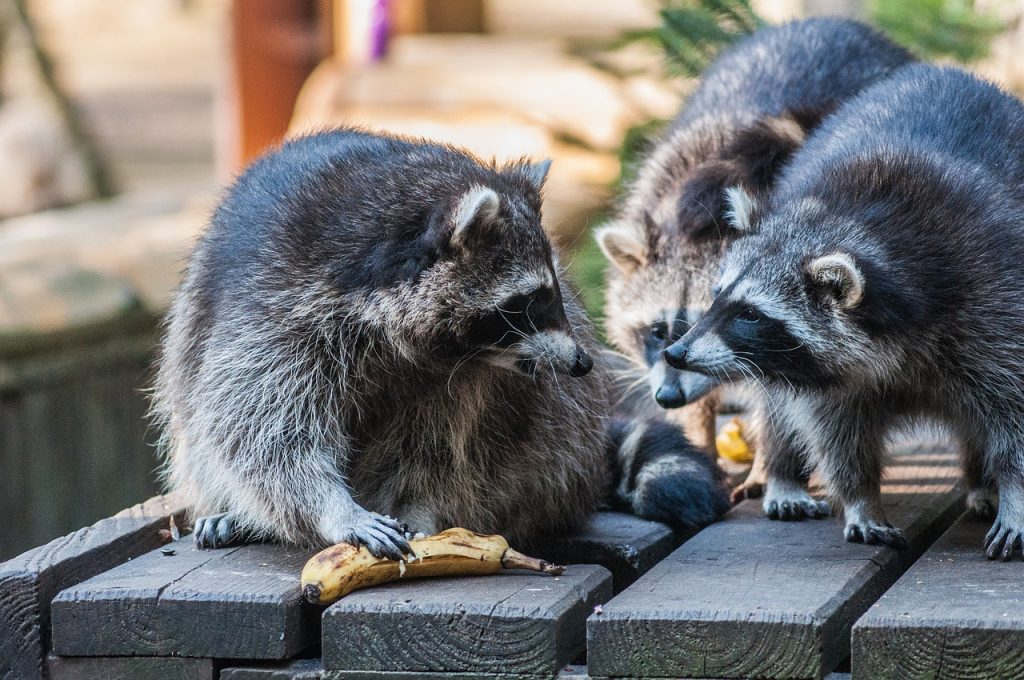Raccoon canine distemper cases have increased dramatically compared to last year. The large population and mild winter has contributed to the increase.
Raccoon Canine Distemper in Toronto
Canine distemper is a viral disease that affects the respiratory, gastrointestinal, and nervous systems. Raccoons with distemper may approach people, or curl up to sleep in open areas in close proximity to people. They generally act disoriented or lethargic but can become aggressive if cornered. Canine distemper is often lethal for raccoons.
While canine distemper does not pose a threat to human health, keeps children away from diseased raccoons. They can become aggressive suddenly. Dogs can become infected with canine distemper. The disease is spread when animals have direct contact with body fluids or droppings of an infected animal. There is a canine distemper vaccine for dogs.
Canine distemper is more likely to occur when raccoon populations are large or concentrated. In Toronto, the cycle tends to run every two to three years.
The mild winter has allowed the canine distemper outbreak that started in the fall to continue this spring. Toronto Animal Services (TAS) has declared a canine distemper outbreak. TAS declares an outbreak when service calls for sick, diseased, or dead raccoons increase. Raccoon service calls have increased by 401% compared to last year.
Raccoon Canine Distemper Outbreak in Toronto
| Quarter | Jan-April 2022 | Oct-Dec 2022 | Jan -April 2023 |
| Raccoon Service Calls in Toronto | 719 | 3,722 | 3,601 |

Canine Distemper vs Rabies in Raccoons
Some of the symptoms of rabies and canine distemper are similar. Raccoons are nocturnal so finding a raccoon out during the day looking disoriented or lethargic is a sign of a disease. Raccoons with rabies tend to act more aggressively, while a raccoon with distemper will appear more lethargic and less afraid of humans.
Other Raccoon Diseases
Raccoons can carry several diseases detrimental to the health of both humans and pets. Transmission is usually the result of incorrect handling of the pests, which leads to bites, scratches, or direct contact with raccoon feces. Here are a few of the most common diseases carried by raccoons:
- Rabies: Spread via saliva and causes muscle pain, dizziness, fatigue, loss of appetite, fever, delirium, and irritability.
- Raccoon Roundworm: Also known as baylisascaris, this parasite is found in the pest’s feces and induces unpleasant symptoms like liver enlargement, loss of muscle control, blindness, and disorientation.
- Leptospirosis: Bacteria spread via excrement which causes fever, headache, chills, muscle aches, jaundice, and potentially kidney or liver failure.
- Giardiasis: Gastrointestinal ailment that induces bloating, vomiting, indigestion, and loss of appetite in those afflicted.
- Salmonellosis: When ingested, the Salmonella bacteria bring about abdominal pain and diarrhea.
Raccoon Roundworm
The primary parasite carried by raccoons is the roundworm. Transmitted by eggs in the animal’s feces, roundworms are inadvertently ingested when humans touch the feces, contaminated food, or polluted water sources and then touch their mouths. Young children are especially vulnerable to roundworms, which cause nausea, loss of muscle control, blindness, coma, and sometimes death.
Disease Prevention
Individuals should take precautions when they come in close contact with raccoons.
To prevent the spread of disease:
- Feed pets inside
- Parents should supervise outdoor play to reduce the chance of children contracting diseases.
- Always wash garden vegetables thoroughly to reduce the risk of consuming contaminated food.
- Never approach wild raccoons, especially if they are acting strangely, staggering about, or showing signs of aggression.
Dead Raccoon Removal
Currently, the city of Toronto is fielding 12-14 calls a day about sick or dead raccoons; sick raccoons are the priority. Call 311 to report raccoons displaying abnormal behavior. If a raccoon dies in your yard, keep pets away from it and avoid direct contact. You cannot dispose of an animal carcass in the garbage bins, but residents can bring cadavers to any of the three Toronto Animal shelters for disposal. Critter Control offers dead animal removal.
Raccoon populations often harbor a number of dangerous diseases and parasites that can easily be transmitted to humans who do not take proper precautions. Contact the wildlife experts at Critter Control to prevent the spread of disease and safely remove raccoons from your property.

